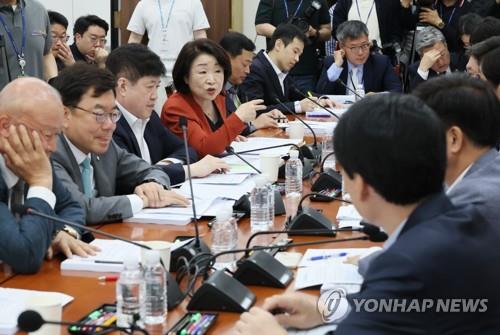- California Assembly OKs highest minimum wage in nation
- S. Korea unveils first graphic cigarette warnings
- US joins with South Korea, Japan in bid to deter North Korea
- LPGA golfer Chun In-gee finally back in action
- S. Korea won’t be top seed in final World Cup qualification round
- US men’s soccer misses 2nd straight Olympics
- US back on track in qualifying with 4-0 win over Guatemala
- High-intensity workout injuries spawn cottage industry
- CDC expands range of Zika mosquitoes into parts of Northeast
- Who knew? ‘The Walking Dead’ is helping families connect
Parliamentary subcommittee passes special bill to help ‘jeonse’ fraud victims
A parliamentary subcommittee passed a special bill Monday aimed at assisting victims of a series of home rental scams, including offering them interest-free loans.
After five rounds of meetings, the legislative subcommittee of the National Assembly’s Land, Infrastructure and Transport Committee passed the bill, which is aimed at providing support measures for the victims of a series of massive frauds abusing the country’s unique rental system, called “jeonse.”
Under the bill, the government will provide interest-free loans to affected tenants for up to 10 years for the portion of the deposits they made. These loans will cover the amount that tenants are entitled to before other priority creditors, such as financial institutions, when the properties they reside in are put up for auction or public sale.
Loans at a low-interest rates will be made available for amounts exceeding the specified limit.
Under a series of fraud cases across the country, alleged suspects rented highly collateralized homes to the victims for deposits worth tens of millions of won. The homes ended up being put up for auction, as they failed to repay debts to financial institutions, leading to victims facing eviction without getting their deposits back.
The special bill targets victims whose deposits do not exceed 500 million won (US$379,000).
Tenants residing in properties purchased through an unconventional method called “gap investment” are also covered by the bill. These real estate transactions typically involve deposits equivalent to around 90 percent of a property’s value.
Furthermore, the bill includes the Korea Housing and Urban Guarantee Co. covering 70 percent of the legal fees incurred by tenants who are attempting to purchase homes that were put up for auction or public sale.
At least four victims, in their 20s and 30s, of the frauds were found dead. The last victim, a woman in her 30s, was found dead in an apparent suicide in western Seoul. She had reportedly been defrauded out of her jeonse deposit by a notorious rental scammer, who had owned 1,139 multifamily housing units in western Seoul but died last October without paying deposits to their tenants.
The special bill is expected to pass through a plenary session Thursday.












